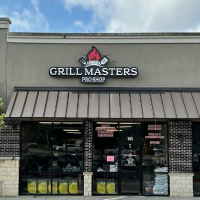The Great Grill Debate: Big Green Egg vs. Gas Grill vs. Pellet Grill

The Great Grill Debate: Big Green Egg vs. Gas Grill vs. Pellet Grill
Choosing items for your outdoor kitchen involves considering functionality, durability, style, and your specific cooking and entertaining needs. In this article we are going to focus more on selecting the right or “best” grill for your outdoor kitchen. But first, here’s a guide to help you pick out the right items for your outdoor kitchen:
1. Define Your Space
- Layout: Determine the size and shape of your outdoor kitchen area.
- Zoning: Consider areas for cooking, dining, and lounging.
- Grill: Choose between gas, charcoal, or pellet grills based on your cooking style.
- Smoker: If you enjoy slow-cooked meats, consider adding a smoker.
- Pizza Oven: A wood-fired or gas pizza oven can be a fun addition.
- Side Burners: Useful for sauces and side dishes while grilling.
- Outdoor Refrigerator: Keeps drinks and ingredients handy.
- Sink: A prep sink makes cooking and cleaning easier.
- Prep Surfaces: Choose durable materials like stainless steel, stone, or concrete.
- Bar Area: A counter for serving drinks or food can enhance your space.
- Cabinets: Weather-resistant cabinets for storing utensils, dishes, and tools.
- Shelves: Open shelves can hold spices, plants, or decorative items.
- Drawers: Ideal for keeping grilling tools organized.
- Fire Pit: A fire pit can provide warmth and a gathering spot.
- Patio Heaters: Extend the usability of your outdoor kitchen into cooler months.
The Big Green Egg
Pros:- Versatility: The Big Green Egg is a kamado-style grill that can grill, smoke, bake, and even roast. This versatility allows you to experiment with various cooking techniques, from low-and-slow smoking to high-temperature baking and steak-house-quality-searing.
- Flavor: The ceramic construction of the Big Green Egg retains heat and moisture, resulting in flavorful, juicy meats. It gives food a unique, smoky flavor that many enthusiasts appreciate.
- Heat Retention: The thick ceramic walls provide excellent insulation, allowing for consistent temperatures and reduced fuel consumption. Once heated, it maintains its temperature for an extended period.
- Durability: Made from high-quality materials, the Big Green Egg is built to last, even in harsh weather conditions.
- Learning Curve: Mastering the Big Green Egg can take time, especially for beginners. Managing temperature and smoke levels requires practice and patience.
- Weight and Portability: These grills are heavy and not easily moved. Once you set it up, it's best to leave it in place.
- Price: The initial investment for a Big Green Egg can be higher than that of gas or pellet grills, especially when considering accessories.
- Limited Cooking Space: The cooking surface area can be smaller than some gas grills, making it less ideal for cooking for large groups.
Gas Grill
Pros:- Convenience: Gas grills ignite quickly and allow for precise temperature control, making them easy to use for beginners and experienced cooks alike.
- Speed: With a gas grill, you can start cooking in minutes since it heats up quickly compared to charcoal or wood-based grills.
- Consistent Heat: Gas grills provide consistent heat across the cooking surface, which is essential for even cooking.
- Variety of Sizes: Gas grills come in various sizes, making it easy to find one that fits your outdoor kitchen space and cooking needs.
- Flavor: Gas grills typically do not impart the same smoky flavor as charcoal or wood-fired grills, which may be a drawback for some cooking enthusiasts.
- Fuel Dependency: You need to have a propane tank or a natural gas line, which can be an additional expense and may require refills.
- Less Versatile: While some gas grills have features for smoking or searing, they generally do not offer the same versatility as kamado or pellet grills.
- Durability: While many gas grills are built to last, some lower-end models may not withstand the elements or heavy use.
Pellet Grill
Pros:- Flavor and Versatility: Pellet grills use wood pellets for fuel, imparting a rich, smoky flavor to your food. They can grill, smoke, bake, and roast, providing a versatile cooking experience.
- Ease of Use: With digital temperature controls and automatic feeding systems, pellet grills are relatively easy to operate. You can set the temperature and let the grill do the work.
- Consistent Temperature: Pellet grills maintain consistent temperatures, making them great for low-and-slow cooking.
- Variety of Pellets: You can experiment with different wood pellets (like hickory, mesquite, or applewood) to enhance the flavor of your food.
- Price: High-quality pellet grills can be expensive, and the cost of wood pellets can add up over time.
- Electric Dependency: Pellet grills require electricity to operate the auger and fan, which may be a consideration if you want to grill off the grid.
- Longer Preheat Time: Compared to gas grills, pellet grills can take longer to preheat, especially for high-temperature grilling.
- Limited High-Temperature Cooking: While they are excellent for smoking and roasting, some pellet grills may struggle to reach the high temperatures needed for searing.
Conclusion
Choosing between a Big Green Egg, gas grill, or pellet grill ultimately depends on your cooking style, preferences, and lifestyle. The Big Green Egg offers versatility and flavor but requires a learning curve, while gas grills provide convenience and speed. Pellet grills combine ease of use with rich flavors but may come at a higher cost. Consider your cooking habits, the available space, and the time you can dedicate to grilling to make the best choice for your outdoor kitchen.Grill Masters Pro Shop
-
Grill Masters Pro Shop
- January 22, 2025
- 830-438-0255


